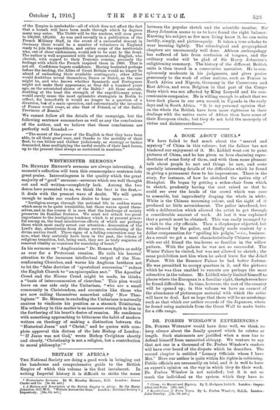WESTMINSTER SERMONS.*
Dn. HENSLEY HENSON'S sermons are always interesting. A moment's reflection will turn this commonplace sentence into great praise. Interestinguess is the quality which the great majority of " good" sermons—sermons which are well thought out and well written—completely lack. Among the two dozen here presented to us, we think the best is the first,— it deals with the present wave of doubt. We will quote 'inough to make our readers desire to hear snore:—
"Irreligion sweeps through the national life in sudden waves which seem to be quite irresistible, but those waves spend them- selves, and in due course it is seen that the landscape of society preserves its familiar features. We must not attach too great importance to the irreligious tendency which is at present power- ful among us, the least mischievous effects of which are perhaps those which most easily arrest our attention: desecration of the Lord's day, absenteeism from divine service, secularizing of the divine service itself. These signs of a failing convention may be now, what they certainly have been in the past, the tokens of religions transition, but, being such, they are as truly auguries of renewed vitality as oeepqions for searching of heart."
In his sermons on " Anglicanism " Dr. Henson fights as nobly as ever for a Protestant reunion. He calls his hearers' attention to the immense intellectual output of the Non- conforming Churches, and warns his Anglican brethren not to let the " false doctrine of apostolical succession' " reduce the English Church to "an episcopalian sect." The Apostles' Creed and the Nicene Creed might be made, he thinks, a "basis of intercommunion of churches." This plan would leave on one side only the Unitarians, "who are a small community in Christendom, and eccentrics like those who are now calling themselves somewhat oddly New Theo- logians.'" Dr. Henson in excluding the Unitarians is naturally anxious to vindicate his position as a staunch Trinitarian. His orthodoxy in this matter is an immense strength to him in the furthering of his heart's desire of reunion. He condemns
with something approaching to bitterness the habit of modern writers on theology of making a distinction between the " Historical Jesus " and " Christ," and he quotes with com- plete approval this dictum of the late Bishop of London: " If Jesus was not God,' wrote Bishop Creighton shortly and clearly, Christianity is not a religion, but a contribution to moral philosophy."


























































 Previous page
Previous page